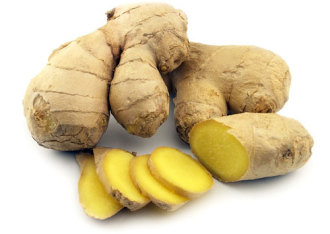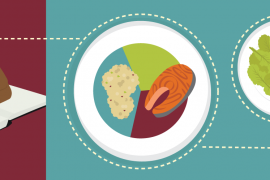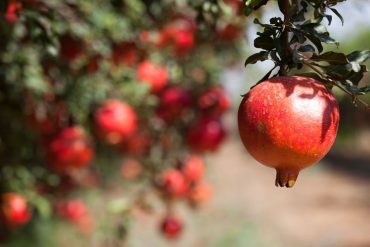Ginger (Zingiber officinale Roscoe) is a flowering plant that originated in China and is also related to turmeric and cardamom. The rhizome (root) is the part that is used for spice, as a preservative, a tea and for medicinal purposes. Ginger is one of the healthiest spices known. It is packed full of nutrients and bioactive compounds that offer tremendous benefits to your body.
So why should you add ginger to your diet? Take a look at some of the amazing health benefits:
Antibiotic- The effects of ginger and antibiotics on Staphylococcus aureus and S. pyreus infections shows that ginger extract may be superior. (1)
Anti-Fungal– Ginger has anti-fungal properties. (2)
Cancer-Several studies have shown the ability of ginger to defeat numerous types of cancer cells, including breast, colon, pancreatic, prostate and skin cancer. (3, 4, 5, 6, 7, 8, 9, 10)
Diabetes Prevention-Studies show that diabetes can be prevented and treated along with lowering blood sugar levels. (11)
Gastric Distress-Ginger inhibits H. pylori, which helps prevent ulcers. (12)
Inflammation-Inflammation goes hand in hand with many chronic conditions. Ginger inhibits nitrous oxide production and inflammatory cytokines. It is very effective in dealing with arthritis and other general inflammatory illnesses. (13)
Menstrual Pain– A double blind study showed powdered ginger capsules to be as effective in treating menstrual pain as non-steroidal anti inflammatories and placebos. (14)
Nausea-Gingers ability to relieve nausea has long been known. It is useful for morning sickness, sea sickness and nausea of all sorts. (15, 16)
Periodontal-Ginger has wonderful antibacterial effects on periodontal disease. (17)
Toxicity-Ginger helps prevent the toxic effects of numerous substances including MSG, pesticides, and cancer drugs. (18, 19)
Possible Interactions:
Ginger does have a few negative side effects. Allergic reactions usually result in a rash, although some individuals experience heartburn, bloating, gas, burping or nausea. These symptoms are more common when consuming ginger in a powdered form.
According to Drugs.com ginger interacts with prescription drugs such as heart medication, diabetes medication, warfarin, aspirin, NSAIDs and blood thinners.
Please discuss any concerns with your health care practitioner.
Make Your Own Ginger Honey Syrup
Ingredients
Ginger root
Honey
Directions
Peel a large piece of ginger, grate it and place in pan.
Pour in enough honey to cover the ginger.
Simmer 10-15 minutes, or until ginger is mushy, allow to cool slightly. (You can strain the ginger out of the honey if you like. I leave mine with the honey).
Pour into jar, label and date.
Refrigerate and it will last for several weeks.
Enjoy this in smoothies, milk, tea, on ice cream, pancakes, hot oatmeal, or on a fruit salad. You can also add 2-3 Tablespoons to a cup of hot water for tea.
Two Alternative Recipes for Ginger Syrup That Don’t Heat Honey
Option One
Simply to add 4-5 Tbsp. of dry ginger to 1 pint of honey.
Directions:
1. Pour the honey in the jar until it is half full, add the powdered ginger, and then add the rest of the honey.
2. Stir the honey well until the ginger is well incorporated. This honey can be used instantly, but it takes a lot of stirring.
Option Two
Infuse the honey with raw ginger slices. This takes 4-6 weeks.
Directions:
1. Peel a 3 inch piece of fresh ginger rhizome, and slice thinly, like you would a carrot.
2. Place the ginger in a clean one pint mason jar and cover with honey. Be sure to pop or push the air bubbles out of the honey.
3. Put a lid on the ginger honey and place in any cupboard. Let it sit for 4-6 weeks and strain out the ginger.
Be sure to always use clean sterilized containers, lids and utensils to avoid contamination.
References:
http://umm.edu/health/medical/altmed/herb/ginger
1. http://www.ncbi.nlm.nih.gov/pubmed/17010224
2. http://www.ncbi.nlm.nih.gov/pubmed/12588480
3. http://www.ncbi.nlm.nih.gov/pubmed/18972844
4. http://www.ncbi.nlm.nih.gov/pubmed/19481070
5. http://www.jnutbio.com/article/S0955-2863%2807%2900133-7/abstract
6. http://onlinelibrary.wiley.com/doi/10.1002/ijc.23923/abstract
7. http://online.liebertpub.com/doi/abs/10.1089/jmf.2010.1191
8. http://www.ncbi.nlm.nih.gov/pubmed/17066513
9. http://www.medicalnewstoday.com/articles/41747.php
10. http://www.ncbi.nlm.nih.gov/pubmed/18030663
11. http://www.ncbi.nlm.nih.gov/pubmed/17010224
12. http://www.ncbi.nlm.nih.gov/pmc/articles/PMC3136331/?tool=pubmed
13. http://www.sciencedirect.com/science/article/pii/S0278691509000775
14. http://www.ncbi.nlm.nih.gov/pubmed/19216660
15. http://www.ncbi.nlm.nih.gov/pubmed/3277342
16. http://www.ncbi.nlm.nih.gov/pubmed/12233808
17. http://www.ncbi.nlm.nih.gov/pubmed/18814211
18. http://www.ncbi.nlm.nih.gov/pubmed/19579948
19. http://www.ncbi.nlm.nih.gov/pubmed/19371770








